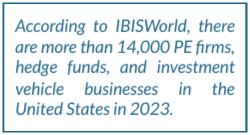Industry Trends
Largest Transactions Closed
- Target
- Buyer
- Value($mm)

If you are a business owner or CFO, you are probably getting five or 10 emails per week (or even per day) from unknown companies or people asking the question “Have you considered selling your business?” or “Do you have an exit strategy for your business?”
Most likely, you’ve received the email because your company information was obtained through a database by a company searching for businesses to invest in, either to grow an existing business or to start a “platform” and add multiple businesses, creating a larger, more valuable company. This is called a buy-and-build strategy.
The email might say they have a ready and willing buyer on hand right now for your company. You might wonder, “Is this legitimate?” or “Should I be considering this?” or “Who are these people, and why me and my company?” No doubt you are curious — but should you respond? And if so, which query should you explore? Let’s look at the types of organizations that might be sending you an email so you can better decide which ones you would like to respond to and when.
The emails you are receiving are likely from one of the following groups: strategic buyers and competitors, financial buyers, family offices and high net worth individuals and, finally, bankers, brokers, or intermediaries that represent all of the above. Let’s take a look at each of these categories.
These companies are typically in the same industry as your company and are looking to; expand into your geography, add your product or service offerings to expand theirs, obtain more employees or to increase the footprint of their existing business. They see purchasing your business as an easier or more efficient way to achieve their growth strategies than building the same thing from scratch. Their goal might even be simply to eliminate competition.
If a strategic buyer is reaching out to you to acquire your business, you will probably be contacted by someone in their corporate development team or the CFO’s office, or by an investment banker they have hired to source acquisitions. In fact, a competitor will typically use an investment banker for the sake of confidentiality in early stages.
These buyers include private equity (PE) firms, venture capital firms, and investment banks whose goal is to grow the value of a company and then sell it for a profit. These firms typically explore a buy-and-build strategy. They start with a platform acquisition and then grow profitability by acquiring other small companies to add to it, creating a larger company that will deliver a larger return when they sell the whole platform. These groups are anxious to put their capital to work. If a PE firm is unable to deploy cash (because they can’t find a business to purchase or don’t close the transaction), they will have a more difficult time raising funds from their outside investors, called limited partners (LPs), in the future.
PE firms and other financial buyers will usually contact you through another party unless they have their own corporate development team. If you’re considering selling your company, you might hire an investment banker to market your business to multiple PE firms (and other buyers). That way, you can obtain multiple offers and choose the right one based on your needs and goals in the transaction.
These are wealthy individuals or families interested in investing their own cash reserves by acquiring a company as a long-term investment. Sometimes the family office takes on the appearance of a PE firm. The family or high net worth individuals can also be PE LPs.
Bankers and brokers can represent a buyer or a seller. Investment bankers can handle larger transactions and can offer other services that brokers and intermediaries can’t, such as a sale to an ESOP. An investment banker could be reaching out to you because one of their buy-side clients wants to acquire a business similar to yours. They could also be reaching out to discuss your exit strategy and find out whether they can assist you in executing this strategy, including taking your company “to market,” managing the selling process, and finding a suitable buyer for you.
 Overall, the people behind the emails are primarily financial buyers and, more specifically, PE firms. There are many, many different types of financial buyers with different investment goals and even different personalities. They have a team searching for companies to buy, and they have agreed to pay a “finder’s fee” to other firms that exist just to conduct such searches, or they do both.
Overall, the people behind the emails are primarily financial buyers and, more specifically, PE firms. There are many, many different types of financial buyers with different investment goals and even different personalities. They have a team searching for companies to buy, and they have agreed to pay a “finder’s fee” to other firms that exist just to conduct such searches, or they do both.
It is important to understand the origination of an email that alludes to selling your company so you understand the motivation behind the email. If the email comes from a finder firm that doesn’t know much about your company and is just on a hunting expedition on behalf of a PE firm, you may be wasting valuable time going down that path. For help in choosing the right strategy, check out this guide on selecting the best exit strategy.
On the other hand, if an investment banker has sent the email, you might give it some thought. Investment bankers maintain relationships with PE firms and understand the types of companies they invest in. If an investment banker reaches out to you, there is a good chance they already have a list of buyers who would be seriously interested in your company or even a specific client who has engaged them to find companies such as yours.
PE has recently shown greater returns than the public markets, which is contributing to the growth and level of investment activity of these firms. Consistently high PE returns in any given industry increases investment activity in that area and drives up company purchase prices, enticing owners with large multiples paid on their businesses to consider their options. If executed properly, you may find that selling to a PE firm could be a great opportunity. Not only can you benefit from purchase prices at all-time highs, but you also will likely have the opportunity to reinvest some of your proceeds into the platform for a future payout when the platform sells. This is called the second bite of the apple concept, which can sometimes be more lucrative than the first transaction.
Learn more about selling to a PE firm: Key Considerations in an Equity Rollover
Many business owners decide to sell their company after receiving an unsolicited offer from a prospective buyer. Perhaps growing revenues and improving profitability have required your full attention and you’ve never stopped to consider the value you have created in your company. An attractive initial offer may be an unexpected surprise, motivating you to consider the sale. You may be wondering if this is the right time? Read about when to sell your business.
Before you ink a letter of intent (LOI) to sell the company, you should ask several questions:
The crucial first step in evaluating an offer to purchase is to understand and compare recent market transactions in the industry. An analysis of public stocks and recent acquisitions of other private companies may yield ratios (multiples of cash flow, revenue, or earnings) that can be applied directly to your company.
Keep in mind that if one buyer finds your company attractive and valuable, most likely others will too. The business may be worth more to the “highest and best” user in the industry. Those buyers will pay a premium over market multipliers for your company. Additionally, the exercise of identifying the best buyers may lead to a bidding environment that drives up the purchase price higher still.
Price is not the only determining factor of an attractive offer. A high multi-million-dollar purchase price sounds great, but not if 75% of the purchase price is contained in a 10-year note (as opposed to an all-cash offer). Likewise, the terms of an employment agreement or a non-compete agreement are all part of the value you receive.
The sales process is hard, diverting time and management resources away from the operations of the business. Negotiating the final business terms can be contentious and confrontational. In these instances, there are actionable strategies you can use for managing stress during the sales process.
This friction represents a risk point if you will be required to remain with the buyer for a period of time. Working with an investment banker to manage the process — someone who knows market values and terms — can provide a layer of protection.
Selling a company without market knowledge is like flying blind. You don’t know how much you can risk and how far you can push. Market knowledge gives you power throughout the sale process and provides the greatest opportunity for you to access the personal wealth tied up in your company.
So, while receiving these emails on a daily basis may be annoying at times, it is also a signal that your company is in demand. If you have an interest in exploring potential offers, it is imperative that you find the right partner to work with you — and that’s someone who can help you evaluate all the options. Some of the emails you’ll get come from someone who can only pursue one avenue but it’s always best to work with someone who can explore all the options. At PCE, we are a full-service investment bank and look forward to discussing your ideal exit or partnership and then executing that for you.
If you’ve been approached by potential buyers or are considering exploring your options, our team is here to help.
Contact our investment banking experts today to discuss your business valuation, explore buyer opportunities, and create a tailored exit strategy. Let us guide you through the complexities of selling your business, ensuring you maximize its value and achieve your goals.

Investment Banking
Chicago Office
224-520-1068 (direct)
nicolek@pcecompanies.com
Connect
224-520-1068 (direct)
407-621-2199 (fax)